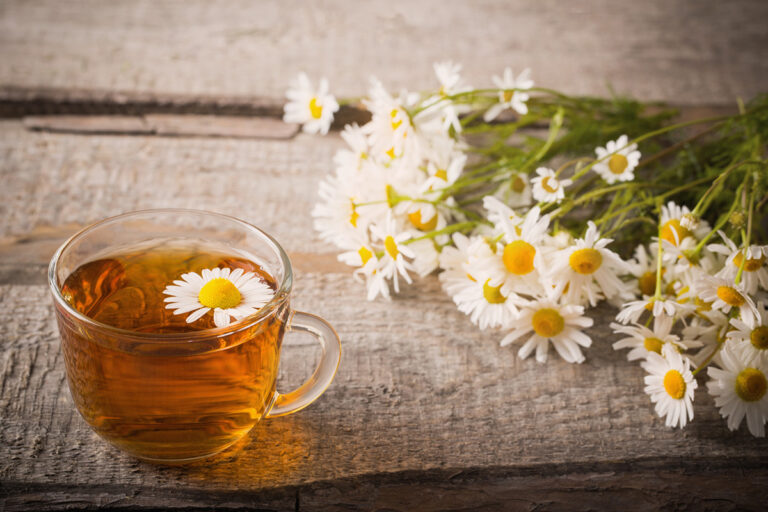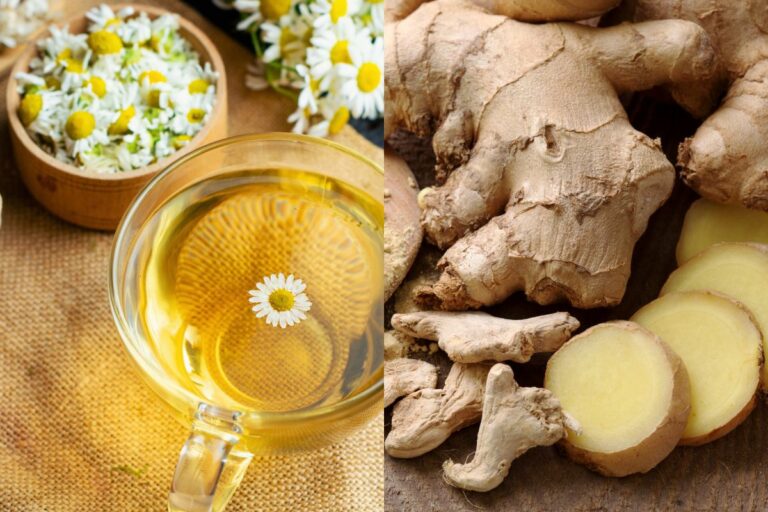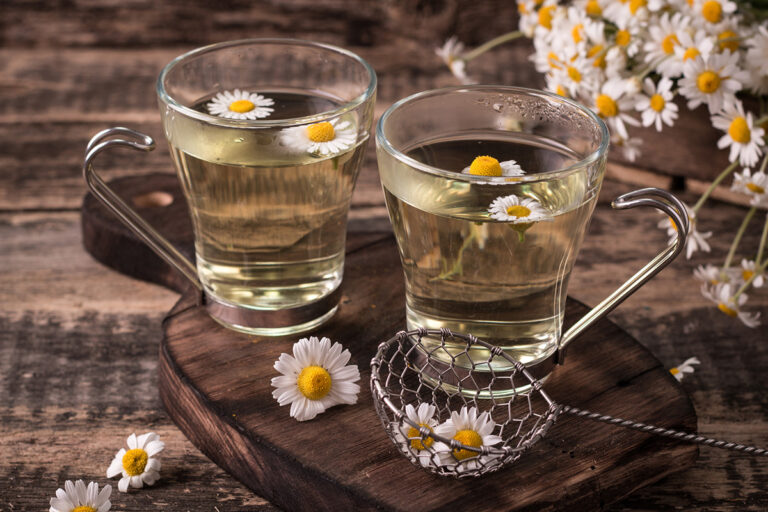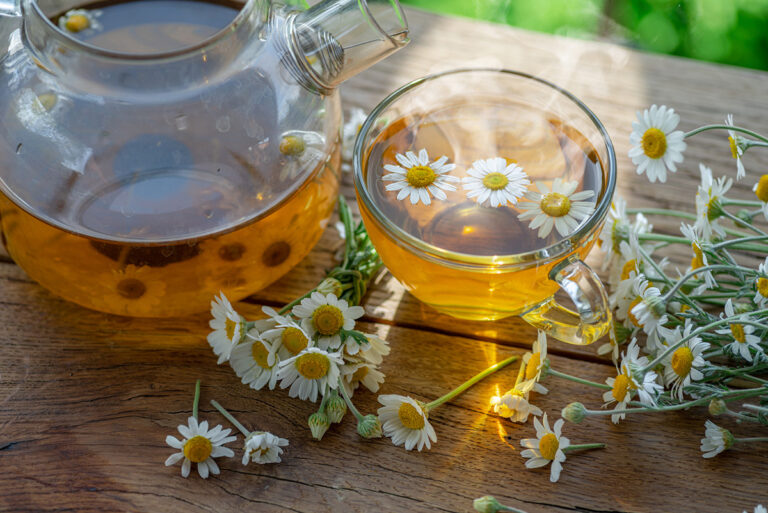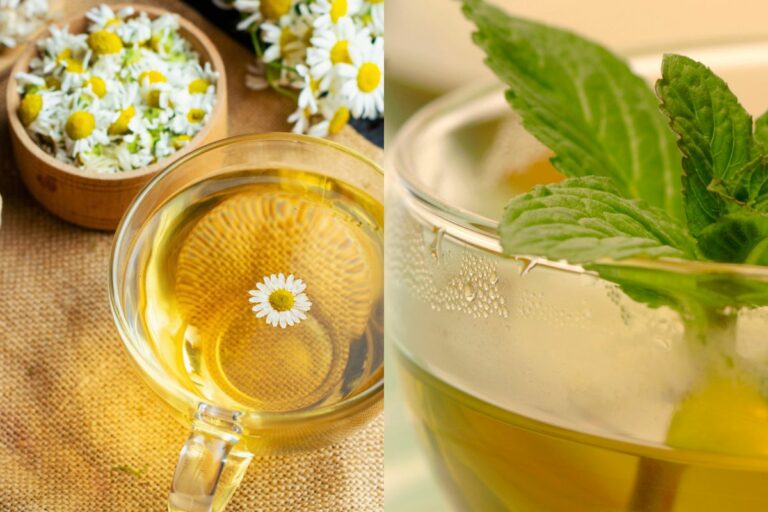Does Chamomile Tea Lower Blood Pressure?
Chamomile tea has been valued for its calming properties and many other benefits for centuries.
But does chamomile tea lower blood pressure?
Some research has indicated that it could potentially aid in reducing blood pressure. However, the research is less extensive and conclusive than for other interventions such as lifestyle changes or prescription medications.

Can Chamomile Tea Lower Blood Pressure?
Chamomile tea is a rich source of flavones, a type of antioxidant.
Research on flavones has explored their possible ability to lower blood pressure and cholesterol, key factors in assessing heart disease risk (1, 2).
One study observed that chamomile effectively reduced hypertensive symptoms and decreased systolic blood pressure significantly, increasing urine output (3).
Further research is necessary before a definitive connection between chamomile and its health benefits for blood pressure can be confirmed.
What Are Other Health Benefits of Chamomile Tea?
Chamomile tea is known for promoting relaxation and alleviating tension and stress. However, did you know that it has other health benefits beyond relaxation?
Here are some of the scientifically proven benefits associated with regularly drinking chamomile tea:
- Improved sleep quality, with studies showing fewer nighttime awakenings and quicker sleep onset (4, 5)
- Digestive health with anti-inflammatory properties that reduce gut inflammation and discomfort (6, 7, 8)
- Blood sugar control, with the potential to help prevent pancreas cell damage from high blood sugar levels (9)
- Heart health with rich content of flavones that have been suggested to lower cholesterol levels (10)
- Studies have connected chamomile tea and its antioxidant, apigenin, to a reduced occurrence of specific cancer types, including breast, digestive tract, skin, prostate, and uterine (11, 12, 13). One research study of 537 people showed that individuals drinking chamomile tea 2–6 times per week have a notably decreased chance of being diagnosed with thyroid cancer (14).
There are other potential health benefits, although not as thoroughly studied:
- Cold symptom relief, easing congestion, reducing inflammation, and providing a calming effect that may improve sleep quality (9)
- Reduced anxiety and depression severity when used in aromatherapy or as a supplement (7, 9, 15, 16)
- Enhanced skin health, offering relief for skin issues like eczema and acne, as well as defense against environmental stressors (7, 17, 18)
- The potential to help prevent bone loss (9).
What Are Other Teas Proven to Lower Blood Pressure?
Some other teas besides chamomile are believed to have properties that may help lower blood pressure. These teas include:
- Hibiscus tea: Research findings have indicated that it might aid in reducing blood pressure thanks to its antioxidant and anti-inflammatory effects.
- Green tea: A few studies have found that regular green tea consumption could help lower blood pressure levels.
- Oolong tea: Oolong tea, being partially fermented, contains antioxidants that could potentially aid in lowering blood pressure.
- Rooibos tea: Rooibos tea is a herbal tea rich in antioxidants and could potentially aid in reducing blood pressure.
- Lemon balm tea: Lemon balm tea, an herbal beverage, may contribute to stress and anxiety reduction, which could potentially lead to lower blood pressure.
Remember that these teas should not be considered a substitute for prescribed medications or professional medical guidance.
Who Should Not Drink Chamomile Tea?
Chamomile tea is generally safe for most people and can offer various health benefits.
However, certain individuals may need to be cautious with its consumption or even avoid it altogether:
- Individuals with allergies: For those allergic to plants within the Asteraceae family (ragweed, daisies, chrysanthemums), it’s recommended to avoid chamomile tea.
- Pregnant and breastfeeding women: For pregnant and breastfeeding women, moderate chamomile tea consumption is typically considered safe. However, certain sources point to the possibility of uterine-stimulating effects from chamomile tea, which could potentially increase miscarriage risks.
- People taking blood-thinning medications: Chamomile tea contains natural blood thinner called coumarin, which may interact with certain drugs like warfarin.
- People with a history of hormone-sensitive conditions: Chamomile tea may have mild estrogenic properties, so individuals with a history of hormone-sensitive conditions should avoid drinking it or seek medical advice.
- People undergoing surgery: To reduce the possibility of excessive bleeding during any scheduled surgery, it is recommended to discontinue drinking chamomile tea at least two weeks beforehand.
- People taking sedatives: Chamomile tea has mild sedative effects that can interact with other sedative substances or medications, potentially enhancing their effects.
Conclusion
In summary, the soothing properties of chamomile tea have been recognized and cherished for many years. Some studies suggest it may have potential blood pressure-lowering effects.
However, the research on this topic could be more extensive and conclusive. More research is required to verify the blood pressure-lowering effects of chamomile tea.
Although some teas have been connected to reduced blood pressure, seeking advice from a healthcare provider before changing your diet or health routine is essential.
Overall, incorporating chamomile tea into your routine can provide numerous health advantages. Still, it should not replace prescribed medications or professional medical advice.
If you decided to add chamomile tea to your diet, consider exploring your options before making a purchase.
FAQ
Is Chamomile Tea a Blood Thinner?
Chamomile tea contains a compound called coumarin, which has blood-thinning properties. However, the levels in chamomile tea are usually not high enough to have a significant blood-thinning effect in moderate consumption. Always consult with a healthcare provider if you’re on blood-thinning medications.

